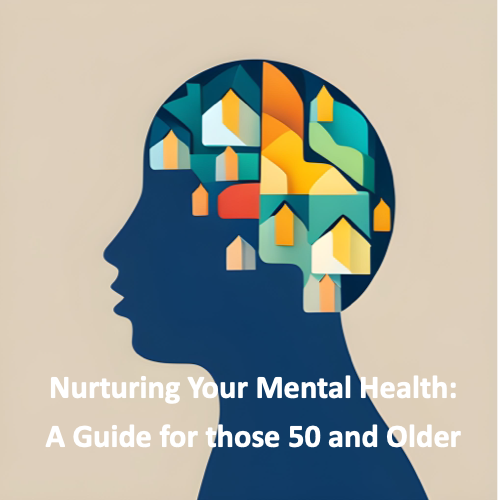It’s Never too Late to Prioritize Your Mental Health
The world we live in often emphasizes physical mental over mental health. It’s crucial to remember that our mental health deserves just as much attention and care, regardless of our age.
When it comes to those of us 50 and older, the significance of mental health becomes even more pronounced. This stage of life is often marked by significant transitions, such as:
- Retirement
- Empty nest syndrome
- Our own health
- Our partner’s health
- Our parent’s health
These changes can sometimes lead to emotional challenges, making it essential to prioritize mental well-being during this phase.
This blog series aims to equip you with practical tips and guidance to nurture your mental well-being. By focusing on self-care, mindfulness, pursuing personal interests, seeking professional help when needed, and cultivating a positive mindset, you can take meaningful steps toward improving and maintaining your mental health.
Remember, it’s never too late to prioritize your mental well-being and invest in yourself, ensuring a happier and more fulfilling life.
Understanding Mental Well-being and Health for Those of Us Over 50
For those of us over 50, understanding the importance of mental health becomes crucial due to the transitions we face during this stage of life. Retirement, a major life transition, can bring about a sense of loss, identity shifts, and financial concerns. Empty nest syndrome, when children leave home, can lead to feelings of loneliness and a need to redefine one’s purpose. Additionally, health concerns may arise, such as chronic conditions or age-related changes, which can impact mental well-being.
It is essential to acknowledge and address these challenges proactively, as they can significantly affect mental health. Emotional challenges, including anxiety, depression, and stress, may arise during this time. By understanding the potential impact of these life transitions and health concerns, those of us over 50, can actively work on maintaining and improving our mental well-being.
Prioritizing mental health during this stage involves recognizing the importance of self-care and seeking support when needed. It is crucial to engage in activities that promote self-care, such as regular exercise, adequate sleep, and healthy eating. Creating and nurturing social connections is equally vital, as maintaining a support system can provide emotional comfort and a sense of belonging. By understanding and actively addressing mental health challenges, those of us over 50 can enhance our overall well-being and embrace this phase of life with resilience and positivity.
Transitions Mess with Our Brain Chemistry
I moved my mother from Ocala Florida to Austin Texas in 1998. At the time my mother was 80 years old and a total pain in the butt person to deal with. I agreed to take her because as the black sheep of the family. I could deal with her with a bit of emotional disconnection and not be sucked in by the emotional games she played.
In early 2002, she fell and broke her arm in multiple places. She could no longer walk with the aid of a walker. We knew this was the beginning of the end.
In the June of 2002, our only child graduated from high school. Less than a month later, I drove my bicycle directly into a car where our speeds exceeded 50 miles per hour. That collision changed my life. You can learn more about that in the post A Near Fatal Bicycle Accident Was Actually a Mammoth Gift.
I rebounded remarkably fast as I was only 46 years old. I was able to drive my son to college at the end of August. My wife and I returned home as empty nesters.
In February of 2003, my mother passed away on her birthday at the age of 85. She made 5 emergency room visits and subsequent hospital stays in the last 6 months of her life.
Building Systems
What kept me sane during this time and not slipping into depression, which is something I inherited from my father, was building personal care systems.
I had a system to keep all of my mother’s medical records readily available. When the nursing home called to say Mom was headed to the hospital, I had a single plastic envelope with everything in it.
I also carefully cultivated relationships at the facility where my mother lived. They knew to call when anything was out of order. They would call me when my mother was being discharged from the hospital and the hospital doctors would change my mother’s medications. This happened multiple times. I had to figuratively slap some hands because I had already had an internal medicine doctor do an extensive review of all of my mother’s medications. The staff had my back!!
I built a team of people to help me physically and emotionally recover from the accident. What I did not realize is how my psyche was affected. I had no fear getting back onto the bicycle but I had a lot of fear initially driving. That is when I sought help from my psychologist.
Next Post – Taking a Holistic Approach to Mental Health
The next post will be about adopting a holistic approach to managing your mental health. It is kind of like weight loss, which I have little experience with, and only focusing on one thing like your diet and ignoring exercise.
A healthy lifestyle should include regular exercise, healthy eating, adequate sleep, social connections, and maintaining a support system.
Please let me know what you think by dropping me a note on my contact page or LinkedIn.
Marc Miller
Like What Your Read? Get Career Pivot Insights
Do You Need Help With ...

Check out our Help Center where you have access to 14 different content portals.


